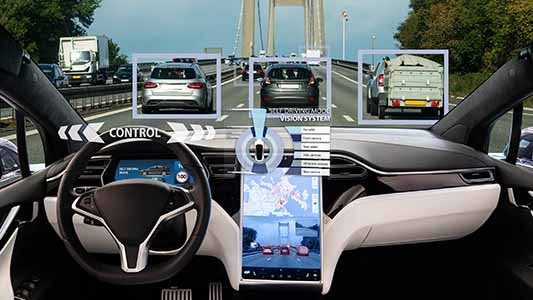With the ever-increasing prices of oil, shrinking resources, and environmental pressure, it is not a surprise that the world is looking toward electric vehicles as a perfect solution. Currently, the electric vehicle industry is one of the most exciting and necessary areas of innovation and more and more companies are betting on it.
The integration of artificial intelligence (AI) has allowed automotive companies to offer a self-driving feature to their electric vehicles, which is expected to disrupt the mode of transportation as we know it. According to Allied Market Research, the global self-driving electric vehicle market would portray a significant growth from 2021 to 2030. The technological development in LiDAR, surge in concerns regarding carbon footprint, and favorable government rules & regulations are the prime factors that contribute to the market growth.
However, self-driving vehicles come at a price: surge in use of energy. According to some analysts, the increased power demand is the major factor that reduces the vehicle range drastically and could eliminate the possibility of self-driving electric vehicles. Thus, some automakers are focused on developing gas-electric hybrid autonomous vehicles.
Race of automakers to launch self-driving electric vehicles:
On the contrary, major automotive companies such as Tesla, General Motors, and Ford have increased their investments in self-driving electric vehicles and improved the use of machine learning to power electric vehicles. General Motors is rather an aggressive investor in the self-driving electric vehicle market. The company’s solid foundation in the electric vehicle industry and large-scale manufacturing infrastructure help it establish a leadership position in the self-driving electric vehicle industry. Furthermore, GM’s ridesharing subsidiary, Cruise could help the company to improve the autonomous vehicle technology and integrate it into electric vehicles. Cruise has already garnered billions of dollars in investment for the advancement of ADS technologies.
Apart from GM, Tesla is the most popular name across the world, especially in Canada when it comes to the launch of autonomous electric vehicles. Tesla has long before announced it will expand its “full self-driving” beta software to Norway and Canada. This update enables self-driving cars to turn in intersections and change lanes in city streets. Moreover, drivers can set destinations and the car will autonomously navigate but it requires a driver for monitoring and the driver can take control at all times. According to Elon Musk, the most promising market for his software update is Canada which advances the penetration of self-driving electric vehicles even more.
Several automakers apart from Tesla such as Google and Audi are in the race to launch their self-driving vehicles in the Canadian market. The government and Transport Canada suggest that driverless vehicle technology is bound to grow rapidly in the coming years and thus, they offer full support to create a favorable environment for autonomous driving.
Although it will certainly take time for transitioning to autonomous electric vehicles in Canada, the heavy investments of major market players make the future of driverless electric cars brighter than ever. Experts predict that driverless vehicles can make the roads safer and society more efficient.
Reasons behind the growth of the self-driving electric vehicle market:
Electric vehicles are affordable than traditional fossil fuel-based vehicles, which is a major incentive for customers to transition to electric vehicles. According to experts, most families will own at least one electric vehicle for their short-term needs by 2025. While the popularity of ridesharing has taken a root in society, the demand for personal electric vehicles will increase in the future. Even if the demand for ridesharing increases, self-driving cars can favor the growth of the ridesharing companies such as Uber and Lyft.
Another prime reason behind the growth of self-driving electric cars is their ability to reduce overall pollution. Gasoline-powered vehicles are the main cause of pollution in the U.S. and responsible for cancer and worsening asthma and respiratory diseases. A fully electric vehicle eliminates emission and a hybrid car produces less than half of the emission than the conventional vehicles. Moreover, electric cars encourage the recycling of auto parts, which reduces the generation of e-waste. Self-driving electric vehicles offer extended utility. One of the major concerns in metro cities is the availability of parking spaces. The adoption of self-driving electric vehicles by rental companies and ridesharing companies will free up thousands of parking spaces and revolutionize the urban landscape. Moreover, self-driving cars can help reduce congestion and road violence incidences drastically. This will help reduce the overload of roads that are used at full capacity every day. Self-driving electric vehicles offer hope for a future where passengers have to merely set the course of destination and relax throughout the commute without worrying about environmental impact, road accidents, and less stress before or after the workday. With the advancements in autonomous technology, this future can very well take place in your future.












